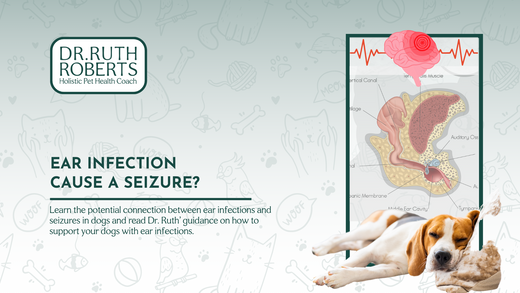Ear infections in dogs result from a mix of factors. Dogs with floppy ears or excessive ear hair, like Cocker Spaniels, are vulnerable due to limited airflow and warmth. Other factors that can contribute to ear infections in dogs are: moisture from swimming or rain, allergies, foreign objects, parasites, autoimmune disorders, endocrine issues, and poor hygiene. These infections can result in discomfort, itchiness, and pain, causing dogs to vigorously scratch or shake their heads. In certain instances, untreated or recurring ear infections can lead to complications beyond the ear itself.
Ear Infections and Seizures in Dogs
While there isn’t a direct cause-and-effect relationship between ear infections and seizures in dogs, there are some underlying factors that can contribute to a connection.
Ear infections themselves typically do not directly cause seizures in dogs. However, there are several indirect ways in which the two conditions could be linked:
- Pain and Discomfort: Severe ear infections can cause significant pain and discomfort in dogs. This discomfort might lead to stress and anxiety, which could potentially trigger a seizure in a dog that is predisposed to them.
- Underlying Conditions: Dogs with chronic health conditions, including epilepsy or other neurological disorders, might be more prone to both ear infections and seizures. An ear infection might not directly cause a seizure, but it could exacerbate an underlying condition that makes seizures more likely.
- Inflammation: Infections, including ear infections, can lead to inflammation in the body. Inflammation could potentially affect the brain and contribute to a seizure in a susceptible dog.
- Medications: Some medications used to treat severe ear infections could have side effects that impact the brain and potentially trigger a seizure. This would be more related to the medication rather than the infection itself.
The Symptoms of Ear Infection and Seizure
Being attuned to your dog’s health and behavior is crucial for early intervention. Recognizing the signs of both ear infections and seizures can help address these issues promptly.

If you suspect your dog is experiencing a seizure, it’s important to consult a veterinarian immediately.
Supporting Dogs with Ear Infections
Addressing ear infections in dogs involves a comprehensive approach that goes beyond treating the infection itself. Consider the following strategies to support your dog’s overall well-being:
- Clean Up the Gut: The gut plays a pivotal role in overall health and immunity. The health of your gut can impact many parts of the body, including the ears. The imbalance in gut bacteria (dysbiosis) could contribute to various health issues, including chronic ear infections. Dietary changes and supplements that promote gut health may be recommended. You can get a wealth of knowledge about enhancing your dogs’ gut health by enrolling in our in-depth gut health course.
- Oral Probiotics and Fish Oil: Probiotics are beneficial bacteria that help maintain a healthy gut flora balance. Supporting a healthy gut can optimize the immune system and potentially reduce infection risk. On the other hand, Omega-3 fatty acids in fish oil possess anti-inflammatory properties that could help alleviate inflammation associated with ear infections.
- Clean Up the Diet: A well-rounded diet rich in high-quality protein, essential fatty acids, and appropriate nutrients can bolster a dog’s overall health and immune system function. Eliminating potential allergens from the diet might be suggested if food sensitivities contribute to chronic ear issues. You might want to consider double-checking the food brands you’re using to confirm that they adhere to a single protein, single carbohydrate rule. This approach can often be helpful for dogs with certain health issues. If not, you could opt for a better option or try to cook The CrockPet Diet for your dogs.
Reducing the Risk of Ear Infections in Dogs
To minimize the risk of ear infections potentially leading to seizures, here’s what you can do:
- Regular Ear Care: Clean your dog’s ears regularly and carefully, avoiding deep insertion into the ear canal to prevent damage.
- Prompt Treatment: If an ear infection is suspected, seek veterinary care promptly. Early treatment can prevent worsening and potential systemic effects.
- Stress Management: Create a stress-free environment for your dog. Regular exercise, mental stimulation, and a balanced diet contribute to overall well-being.
While the direct link between ear infections and seizures in dogs might not be straightforward, it’s evident that certain factors can contribute to an increased risk. Responsible pet owners should proactively recognize signs of both ear infections and seizures and seek veterinary care as needed. By prioritizing preventive measures and swift intervention, we can ensure our beloved companions enjoy healthy, happy lives, free from the discomfort of infections and the distress of seizures.
FAQ on Ear Infections and Seizure in Dogs
Can ear infections directly cause seizures in dogs?
Ear infections themselves typically do not directly cause seizures in dogs. However, there can be indirect connections between the two due to factors like pain and stress.
How can ear infections lead to seizures in dogs?
Seizures can be triggered by stress and anxiety, which severe ear infections can cause. The discomfort from the infection might lead to stress that could potentially trigger a seizure in dogs predisposed to them.
Can chronic ear infections increase the likelihood of seizures in dogs?
Chronic ear infections might contribute to ongoing stress, which can increase the chances of seizures in susceptible dogs. It’s crucial to manage both the infections and stress levels.
How can I best support my dog's with ear infections to prevent seizure?
Consult your veterinarian for a comprehensive approach. Treating ear infections promptly and considering anti-seizure medications under veterinary guidance can help manage both conditions and improve your dog’s quality of life.
















